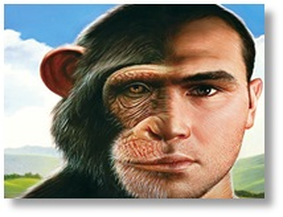Last month we discussed the question of human/chimp breeding. In sharing the fact that it is not genetically possible, I mentioned the idea of cloning and said I would consider discussing that in this month’s “Question of the Month”. That’s what prompted this particular topic. It’s a fascinating subject and one that truly isn’t just “black & white”.
The concept of cloning has been used in a number of sci-fi movies, such as the Jurassic Park series. It has also been carried-out in real life, such as in the example of “Dolly” the famous cloned sheep. But what exactly is cloning?
Put fairly simply, cloning is the creation of a genetically identical “biological entity” (i.e. form of life) such as a plant, insect or mammal. How is this accomplished? In normal development of a living creature, the initial fertilized egg uses the information/instructions found on the DNA in its nucleus to take the creature through every successive stage, building everything needed for growth and functionality, all the way through maturity. The way cloning works is to take the DNA out of the nucleus of a fertilized egg and replace it with the DNA of another animal (of the same kind) that you wish to clone. When the egg develops, it will be using the genetic instructions that created the animal you are trying to clone, thus producing a genetically identical copy. It will not necessarily look physically identical because traits created by genes are sometimes expressed differently due to a number of factors, one of which is environmental conditions. (As a point of interest, identical twins are actually genetic clones. In those cases, however, it occurs naturally by the splitting of a fertilized egg. They still have their own personalities, which can sometimes be quite different.)
A number of animals have already been cloned, such as cattle, sheep, cats, dogs, deer, horses, rabbits and rats. One of the challenges with cloning is that it takes many attempts to be successful. In other words, a lot of fertilized eggs get destroyed along the way because they aren’t developing properly. In the case of Dolly the sheep (first successful clone example, 1996), it took 277 attempts!
So, what about humans? Have they been cloned yet? My answer is, “I don’t know!”. Some will adamantly say no one has tried that because it wouldn’t be moral. Others actually claim to have already done it, although they were not able to produce any proof! With all the strange things going on in the world and considering how we are advancing technologically, I can’t imagine it isn’t being attempted in many dark corners around the world.
So, would it be wrong? Yes and no. What is that supposed to mean? Well, it depends on whether or not you allow God’s Word to weigh-in on the matter. If you leave the Bible out of the discussion, it makes this a very “gray area”. Many people would still fight against it, while others would purport numerous well-sounding reasons for pursuing it. A case could easily be made from Scripture that while we were given dominion over the animals, we don’t have the same authority over other humans. Would this “human clone” have a soul and a spirit? It’s an interesting question. It certainly could and I’ve seen writings from some Christians who are very confident about this. As I think about it, however, I don’t know we can be that certain. It wouldn’t surprise me to find out that God in His sovereignty chooses to instill the clone with a soul and spirit, but I’m not sure we can be dogmatic about it. We are certainly created in God’s image, but since God is not a physical being, this isn’t referring to our physical form but rather the fact that we were created to experience and reflect many of His attributes, such as holiness, love, self-awareness, justice, grace, and mercy. (This has certainly all been marred since the fall, but we are still created in His image.) So simply making a genetic copy of something doesn’t, by the physical process alone, copy the soul or spirit, which are not physical entities we possess, but rather, immaterial entities supernaturally given to us by God.
Another “can-of-worms” issue arises… Who owns the clone? The person who created it? The corporation responsible for the production of the clone? No one? Currently, if while in development (say four months after “conception”) something goes wrong, they just abort the process, destroying the embryo. Since we are confident life begins at conception, this would be taking someone’s life. And what if something goes wrong four months after birth? What about four years after birth? Or 25 years? And who decides if something actually went wrong? If all of a sudden it goes crazy and starts killing everyone around them, many people would feel the clone should be “terminated” and maybe the “creators” of the clone should be held responsible. What if, on the other hand, the clone professes a belief in Jesus Christ and feels this is the only way to heaven. That might be considered “hate speech” and it may be terminated on that basis. I know that sounds extreme, but we are quickly headed that direction, maybe not “termination” just yet, but certainly strict and harsh punishment for those who simply wish to live out their lives as a committed Christian. When I say “headed in that direction”, I mean here in the US. It’s been happening in other countries for decades and throughout history!
Obviously, a lot more could be said about this subject, but the main point is that we should always turn to our “starting point” (God’s Word) when making judgements about any particular subject, including human cloning. Even when the answers might not be immediately clear, we can trust God to guide us as we study His Word.









